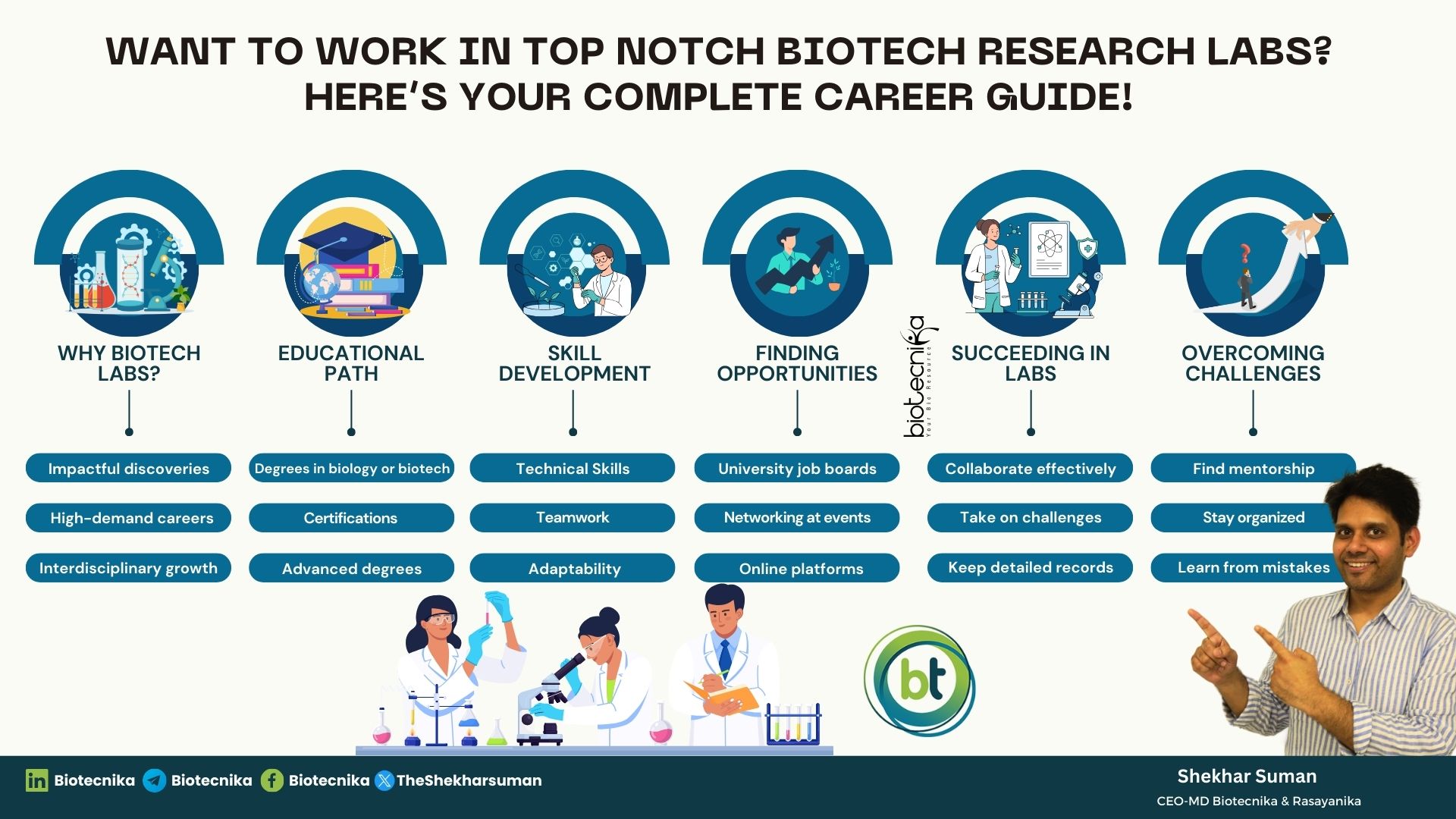How To Get Job In a Biotech Research Lab?
Imagine working in a world-class biotech lab, where you Collaborate with a team to develop vaccines, engineer sustainable food, and uncover treatments for genetic diseases. How thrilling does that sound?
Biotechnology continues to advance swiftly and demands skilled professionals. Biotech labs have emerged as dynamic centers of innovation. Here, committed scientists strive to address tangible global challenges. These labs offer aspiring scientists an incredible chance to impact society significantly.
Have you ever imagined an exciting future in research? If you’re uncertain about entering biotech labs, that’s perfectly fine. We’re here to help you kickstart your biotech journey. Join us as we explore the exciting realm of research together.
Table of Contents
Understanding Biotech Labs – How To Get Job In a Biotech Research Lab?
The biotechnology labs are well-equipped to conduct experiments. They promote technological innovations. These initiatives assist researchers in addressing real-world challenges with biological solutions.
Biotech labs are essential for:
- Developing therapeutics and treatment options.
- Establishing environmentally friendly agricultural practices.
- Advancing bio-based methods for energy production and bioremediation.
Types of Biotech Labs
Biotech labs consist of three groups:
Academic Labs
- They are labs present in universities and research institutions.
- With a focus on basic research, they explore new scientific concepts.
- They offer an opportunity for individuals pursuing graduate or doctoral degrees.
- Examples: the Indian Institute of Science (IISc), the Indian Institutes of Technology (IIT), and Jawaharlal Nehru University (JNU).
Industrial Labs
- These labs are operating within biotech companies.
- Their attention centers on developing innovative products, from pharmaceuticals to agricultural solutions.
- This focus opens up various exciting opportunities for commercializing and broadly applying their research efforts.
- Examples: Biocon Research Centre (BRC), Serum Institute of India, Lupin Biotech
Government Labs
- National or regional agencies run these labs.
- They focus on public health, environmental research, and regulatory science.
- They are known for their great interest in public-sector research and policy impact.
- Examples: National Institute of Immunology (NII), Centre for Cellular & Molecular Biology (CCMB), Central Drug Research Institute (CDRI).
Pursuing a Career in Biotechnology
What makes these biotech labs so desirable? Great! Here’s the list for you:
Meaningful Contributions
- Impact on Lives: The biotech labs enable your participation in groundbreaking research to enhance human health, agriculture, and environmental sustainability. These vaccines and treatments have the potential to save millions of lives.
- Global Challenges: Researchers in biotech labs tackle many issues, such as developing vaccines, creating eco-friendly solutions, and engineering drought-resistant crops.
- Satisfaction: Your knowledge can save millions of lives. You can preserve the planet and provide unparalleled personal and professional fulfillment.
High Demand
- Growing Sector: The biotechnology sector is making incredible strides in healthcare, agriculture, and bioenergy. It is bringing positive changes to the world.
- Career Stability: Skilled biotech professionals are highly sought after, which means you’ll enjoy a secure job and exciting opportunities for growth.
- Innovative Opportunities: Biotech offers numerous chances for innovation.
Interdisciplinary Learning
- Diverse Skillsets: These labs develop a broad skill set through a multidisciplinary approach, not confined to a single subject.
- Cutting-Edge Tools: Researchers gain hands-on experience with advanced technologies like CRISPR gene editing, high-throughput sequencing, and bioinformatics software.
- Collaboration: These labs encourage teamwork across specialties, fostering innovation through diverse perspectives and expertise.
Career paths & opportunities – How To Get Job In a Biotech Research Lab?
| Career Path | Responsibilities | Potential Employers |
| Research Scientist | Conduct experiments and find solutions to real-world problems. Work in academic, industrial, and government biotech labs. | IIT, NII, Genentech |
| Lab Technician | Manage and operate lab equipment. Assist scientists in experiments and research projects. Maintain labs. | Dr. Reddy’s Laboratories, Cipla, DBT-Institute of Life Sciences (DBT-ILS) |
| Quality Control Analyst | Ensure lab processes meet regulatory standards. Work in industrial labs and production units. | Lonza Biologics, Wockhardt Limited, Lupin Limited |
| Bioinformatics Specialist | Analyze biological data using computational tools. | Syngene, Centre for DNA Fingerprinting and Diagnostics, Institute for Stem Cell Science and Regenerative Medicine |
| Regulatory Affairs Professional | Oversee compliance with legal and safety regulations. Ensure biotech and pharmaceutical companies meet regulatory standards. | Intas Pharmaceuticals Ltd., Novozymes India, Aurobindo Pharma |
Preparing for a Career in Biotech Labs
Educational requirements: To work in biotech labs, one needs to have minimum academic requirements of:
- Undergraduate Degree: A bachelor’s in biology, biotechnology, biochemistry, or any life science-related field.
- Advanced Degrees: A master’s or PhD can enhance your expertise and career prospects.
- Certifications: Specialized certifications in molecular biology, bioinformatics, Ai-ML, or laboratory techniques can set you apart.
Some of the trending certifications that you can take up:
- Mass Spectrometry-Based Proteomics Analysis Certification Course
- Next-Gen Sequencing Certification Course
- Stem Cell Technology Certification Course
- Drug Discovery Using CRISPR Technology Certification Course
- Artificial Intelligence in Biology Certificate Course
Skills Required To Get Job In a Biotech Research Lab?
- Technical Skills:
To secure a position in the biotech labs, one must have expertise in lab techniques, equipment, and protocols. These skills will help the person to conduct research effectively.
- Analytical Thinking:
During the research, one can obtain a large and complex biological data set. The person aspiring to work in the biotech labs must be able to interpret these data sets. If a problem occurs during the experiment, one must be able to troubleshoot them.
- Communication Skills:
While working on research projects, one should be able to present the findings clearly to the world. They must have good communication skills to present their work in seminars and conferences effortlessly.
Importance of internships and hands-on experience.
Along with the education and skill set, one must have hands-on experience in the laboratory skill required. These skills can be acquired through internships. The internships help you gain practical experience in a real laboratory environment.
Additionally, these internships allow you to build connections. You can connect with industry professionals and academics,. You can find a mentor to help you navigate the biotech world, and add value to your resume. They make you stand out from the crowd and help you get selected more quickly than the rest.
How to Search for Job Opportunities?
The biotech industry is filled with opportunities. To find the right one for yourself, all you need do is research, network, and leverage various resources. But the bigger question is how to do that. If you are also worried about not finding biotech opportunities, then here are some tips that can help you land the perfect opportunity.
Tips on where and how to search for biotech lab positions.
Let’s talk about where you can look for these opportunities.
- University: The first and foremost place to find these opportunities is universities and their career services. The universities are an excellent place to get started. Some universities have partnerships with biotech companies that will help students land in them. Job boards, career fairs, and networking events such as conferences and seminars can help you scale the opportunities through universities.
- Online Platforms: As technology evolves, digital platforms have become essential in discovering biotech lab opportunities. Important digital platforms include LinkedIn and Indeed. Biotecnika, Science Careers, and Nature Careers are specialized biotech job boards. These platforms enable job applications, allow users to set job alerts, and assist in finding companies aligned with career goals.
- Professional Associations: By joining a professional organization, you can enhance your opportunities to land in the biotech lab. These associations help you to build connections. Some prominent associations are:
Being part of these associations gives you access to exclusive job postings and career resources. Build strong connections with professionals through associations.
Strategies for Networking: One of the best ways to discover new opportunities is through networking. Below are various strategies for achieving success in networking:
- Attend Biotech Conferences and Seminars: Conferences, seminars, and workshops provide great opportunities to connect with industry professionals, stay updated on the latest biotechnology trends, and explore job openings.
- Connect with Professors and Alumni: Your university professors and alumni can be invaluable resources for identifying biotech lab opportunities.
- Connect with Experts on LinkedIn: LinkedIn is more than just a job search resource. It’s also an excellent platform for interacting with professionals in your expertise.
Read More: TOP 10 Biotech Labs to Kickstart Your Research Career in India & Abroad
Apply for Jobs in the Biotech Research Lab – How To Get Job In a Biotech Research Lab?
After dedicating years to education and honing your skills, you’re ready to step into the world of biotech labs. It’s crucial to craft a captivating resume and a friendly cover letter. This will gear up for interviews with thoughtful preparation.
Prepare a CV
Your resume serves as your initial impression. It’s crucial to craft a remarkable resume by emphasizing your educational achievements and laboratory experience. Be sure also to mention internships, certifications, and research projects. Your resume should meet the lab’s requirements to land you in the job.
Create an Engaging Cover Letter
The cover letter highlights your passion for the subject matter. It should clearly express why you would be a fantastic fit for the position. While drafting your cover letter, remember these essential points in mind:
- Share your enthusiasm for biotechnology and highlight your curiosity about the lab’s exciting initiatives.
- Share your experiences and highlight the skills that position you as a strong candidate.
- If applicable, mention any shared connections.
- Discuss your relevant coursework.
Interview tips:
The interview is an excellent opportunity. You can share your skills, enthusiasm for the subject, and the unique qualities you can bring to the team. Here are some tips for to prepare for the interview:
- Research about the lab and the project they are working on. Align your answers with the lab’s goals.
- Prepare yourself for the discussion of your skills and past lab experiences.
- Ask insightful questions to demonstrate your genuine interest in the work.
Excelling in a Biotech Lab Environment
After successfully landing in biotech labs, the next step is to excel there. One should be capable of flourishing in a dynamic and innovative environment. While working your way through the world of research, you should make a significant impact. To excel in this challenging work environment, here is what you need to do:
Primary Attributes for Success
- The biotech labs are filled with experts from different fields; you should collaborate with them. While working with a diverse group of people, you must share your ideas, knowledge, and resources. This will help you build a strong relationship with colleagues.
- The attention to detail will help you work on crucial research projects. Being meticulous with measurements, protocols, and data analysis will ensure the productivity and accuracy of your work.
- You need to stay updated with the latest technologies. You have to adopt the advanced technologies, tools, and techniques.
Use Your Experience
- While working on challenging projects, you will broaden your skillset. Volunteering for these projects will help you to push your boundaries.
- Seek regular feedback from your lab supervisors and peers about your work. This will help you to grow. The constructive feedback will help you identify areas for improvement.
- Keep the detailed records of your work. This is crucial for future reference, productivity, or potential publication.
Overcome Challenges
The biotech is exciting yet challenging, especially for a biotech newborn. From mastering complex techniques to having a work-life balance, biotech research has many hurdles. However, a person with the right approach can navigate these challenges and shine in this competitive environment.
Common Challenges for Newcomers
- The most common challenge in biotech is staying updated with the advancements in the field. A person needs time to get familiar with the latest tools and techniques.
- Another common challenge every biotech professional faces is handling multiple research projects at the same time. The most difficult thing is meeting the deadlines.
- Mistakes are a natural part of the research journey. Whether it’s a little measurement error, a mix-up with protocols, or some troubleshooting hiccups in experiments, these things happen to everyone. And you know what? It’s completely okay.
Ways to Overcome the Challenges
- Getting advice from someone with plenty of experience can really help you tackle these challenges. Learning from the expertise can help avoid common mistakes and refine your skills.
- Remember, when you ask questions and seek advice, you are growing. This will help you to learn new things and gain knowledge.
- It’s okay to face difficulties while working. Every challenge is an opportunity to grow.
The journey in biotech is much more than a career. It is a unique chance to create an impact. Biotech labs are not only tackling global issues but also creating sustainable solutions, significantly improving the lives of millions. While the biotech journey can be challenging, the benefits are unmatched.
Remember, dedication, curiosity, and resilience are the hidden keys to success. On this journey, equip yourself with the essential skills, seek mentorship, and push your boundaries. Follow your passion for research and become a part of groundbreaking discoveries.









































Imtrested